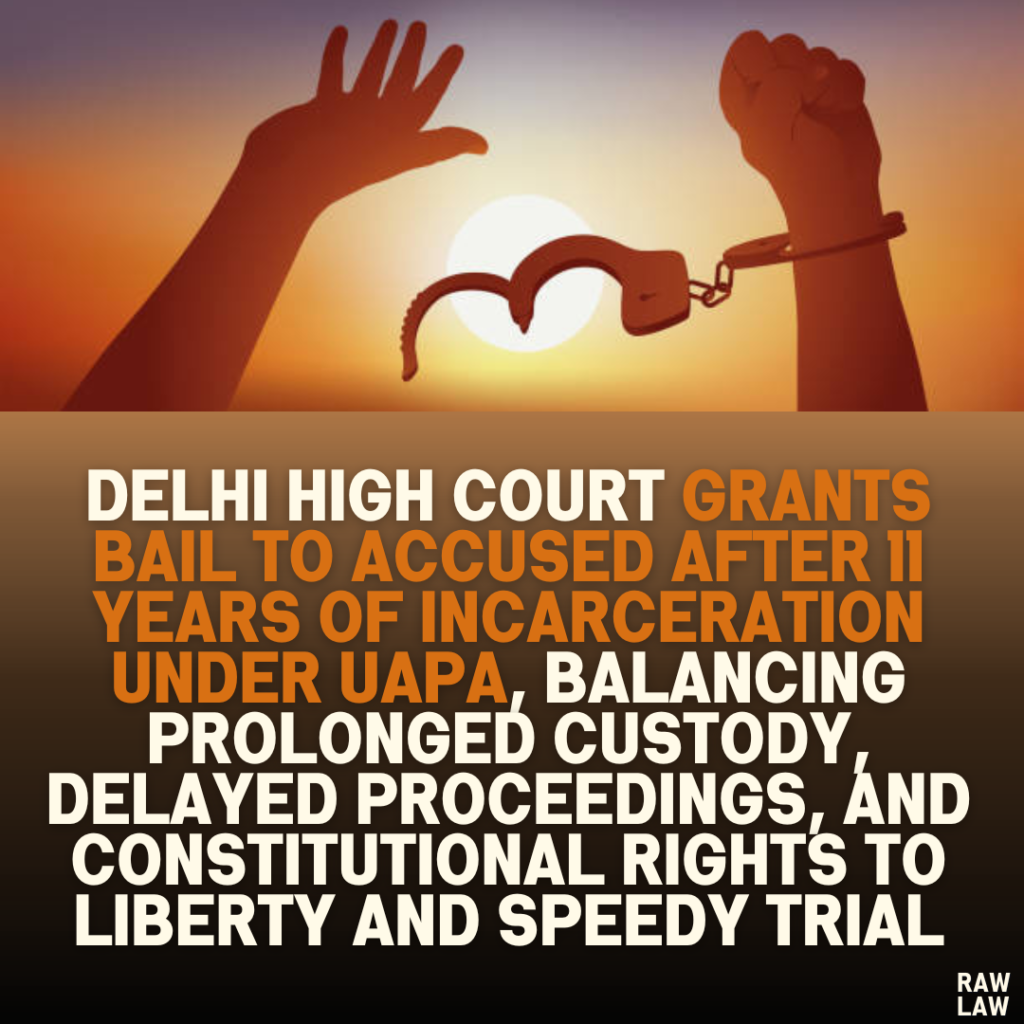Court’s Decision
The Delhi High Court allowed the appellant’s appeal, granting him bail on the grounds of:
- Prolonged Incarceration: The appellant had been in custody for 11 years, far exceeding the sentences imposed on similarly charged co-accused.
- Delay in Trial: The trial was unlikely to conclude soon due to over 150 witnesses yet to be examined.
- Limited Allegations: The court considered the appellant’s alleged role and found the allegations less severe compared to others charged in the case.
Facts
- Registration of Case: The case was registered under the Unlawful Activities (Prevention) Act, 1967 (UAPA), after an FIR was lodged by the NIA in 2012.
- Arrest and Charges:
- The appellant was arrested on October 30, 2013.
- He was charged under Sections 17 (raising funds for terrorism) and 18 (conspiracy or abetment of terrorism) of UAPA.
- Core Allegations:
- The appellant was alleged to have collected and disbursed ₹30,000 to Haider Ali, who was involved in the Patna bomb blasts.
- He was accused of inciting violent jihad through speeches at programs organized by him.
- Trial Status: Out of more than 165 witnesses listed by the prosecution, only 10 had been examined as of January 2025. With significant delays in the trial and frequent changes in presiding officers, the proceedings were far from completion.
Issues
The court examined two key issues:
- Prolonged Incarceration: Did the appellant’s long custody (11 years) without a conclusion to the trial justify granting him bail?
- Balancing Rights: Could constitutional courts harmonize UAPA’s statutory restrictions with the fundamental right to life and liberty under Article 21?
Petitioner’s Arguments
- Length of Custody: The appellant argued that his 11 years of incarceration were disproportionate, especially since:
- Co-accused had already been released or sentenced to lesser terms.
- His trial was unlikely to conclude soon due to procedural delays.
- Limited Role in Offense:
- The appellant had no direct involvement in the Patna bomb blasts.
- His financial contribution of ₹30,000 to Haider Ali was made as part of a charitable zakat fund and without knowledge of Ali’s alleged terror involvement.
- Reliance on Precedent: Citing Union of India v. K.A. Najeeb (2021), the appellant emphasized the court’s duty to uphold Article 21 when statutory procedures cause undue delays.
Respondent’s Arguments
- Terror Connections: The NIA alleged that the appellant was linked to banned organizations like the Students Islamic Movement of India (SIMI) and Indian Mujahideen (IM).
- Flight Risk: One co-accused had fled to Pakistan, demonstrating the appellant’s potential to escape jurisdiction.
- Delays Not Attributable to Prosecution: The prosecution argued that trial delays were caused by changes in presiding officers and not by its inefficiencies.
Analysis of the Law
The court considered Section 43(D)(5) of UAPA, which imposes stringent restrictions on granting bail. However, the court noted:
- Statutory provisions like Section 43(D)(5) should not override constitutional guarantees under Article 21.
- Prolonged detention without trial constitutes a violation of personal liberty and the right to a speedy trial.
The court emphasized that the legislative intent behind anti-terror laws must be harmonized with constitutional safeguards to prevent misuse of such provisions.
Precedent Analysis
The court relied on Union of India v. K.A. Najeeb (2021), where the Supreme Court held:
- Statutory Restrictions and Constitutional Rights: While anti-terror laws restrict bail, constitutional courts retain discretion to grant bail in cases of prolonged custody.
- Balancing Rights: Courts must weigh the gravity of allegations against the delay in trial and its impact on the accused’s liberty.
Court’s Reasoning
The court concluded that the appellant was entitled to bail based on the following:
- Lengthy Incarceration: The appellant had already served 11 years in custody, which was longer than the sentences imposed on similarly placed co-accused.
- Nature of Allegations:
- The appellant’s alleged financial support of ₹30,000 was not conclusively linked to terror activities.
- His alleged participation in programs inciting jihad lacked sufficient evidence.
- Trial Delays: With over 150 witnesses remaining and the trial progressing slowly, the appellant’s continued incarceration would breach his constitutional rights.
Conclusion
The court granted bail to the appellant with strict conditions to ensure compliance and prevent any misuse of liberty:
- Surety Bond: ₹10,000 bail bond with a surety of the same amount.
- Travel Restrictions: The appellant could not leave Ranchi without court permission, except for court appearances in Delhi.
- Monthly Reporting: The appellant was required to report to the local police station on the first Monday of every month.
- Prohibition on Unlawful Activities: Any unlawful activity or attempt to influence witnesses could lead to bail cancellation.
Implications
This judgment has significant implications for under-trial prisoners charged under stringent anti-terror laws:
- Prolonged Detention: The court underscored that statutory restrictions must yield to constitutional guarantees when trials are unduly delayed.
- Right to Speedy Trial: The case reinforces the judiciary’s role in safeguarding personal liberty under Article 21.
- Judicial Discretion: The judgment highlights the court’s authority to grant bail despite statutory prohibitions, ensuring that laws are not misused to perpetuate injustice.
By granting bail, the Delhi High Court reaffirmed its commitment to upholding constitutional rights, even in cases involving serious allegations under anti-terror laws.



